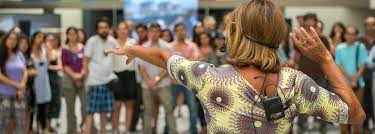SDGs Training for Multipliers in Review from Migrant Communities to Social Innovators

The Sustainable Development Goals have been carefully developed through a three-year process involving UN Member States, 83 national surveys engaging over 7 million people, and thousands of actors from the international community, making it the biggest consultation in UN history. A people-friendly language was adopted at the very beginning of the process to enable the mass global participation invoked at the inception of the Goals.
Convinced that the SDGs should not be separated from the global community who forged them, Gaia Education, in partnership with UNESCO GAP Secretariat, developed an educational tool – the SDGs Flashcards – and the associated Training for Multipliers to ensure their effective use.
The Training for Multipliers was designed to build the capacity of facilitators to hold the vitally important conversations on how to implement the 17 SDGs and their 169 targets at the local and regional scale, in ways that are carefully adapted to the biocultural uniqueness of each location.
In one year, from Hamburg to Santiago, UNESCO GAP Secretariat and Gaia Education have conducted 20 trainings, reaching over 1,000 people. Participants explore the 17 SDGs in question-focused small group conversations, to collaboratively identify actions and solutions aimed at implementing the global goals in ways that are relevant to their lives, communities, cities and regions.
“The SDGs training gave me a highly practical base for the implementation of these methodologies in a variety of contexts. Exceeded my expectations.”
“Great interactive sessions, came out with a much better idea of the SDGs and how to apply them.”
UNESCO Week for Peace and Sustainable Development

During the UNESCO Week for Peace and Sustainable Development: The Role of Education in Ottawa, a workshop was conducted for the community of Education for Sustainable Development (ESD) and Citizen Education educators and GAP Partners. Amongst them, there was a real consensus that SDG4 could unleash the power of all the other 16 Goals. A similar seminar, led by the UNESCO GAP team in Argentina during the Latin America and the Caribbean Regional Workshop, was given to more than 170 city representatives from over 40 cities and 20 countries, including mayors and deputy mayors, experts, authorities and practitioners.
“I will use them in Town Hall meetings, related to local zoning and natural resource use and to all future projects. The cards can help to frame conversations from housing and renewable energy to agricultural practices and how we can organise ourselves collectively and democratically.”
From Migrant Communities…


The highly participatory small group work and question-centred trainings engage local communities in a process that turns what might be perceived as a remote international agenda into meaningful projects that are locally relevant and can be collaboratively implemented by the communities themselves.
“It way exceeded my expectations. The interactivity, the discussion groups, the physical interaction of forming groups, the spatiality of the work, the dialogue.”
In Sicily and Denmark two communities of migrants engaged in meaningful conversations on the distinct applicability of the goals between their countries of origin and of destination. While prioritising the goals both groups identified SDG16 of Peace, Justice and Strong Institutions as the goal needing utmost attention in their countries of origin. For them the decisions we make, the governance of our natural resources and the management of our conflicts all happen through strong institutions promoted by SDG16.
“It was a very well-thought out programme, far more engaging than I expected.”
…to Social Innovators


The final seminar of the year took place during the fiiS Santiago, the most engaging International Festival of Social Innovation in the Americas. Over the last five years fiiS has become a movement of young innovators and organisations generating progressive changes in society in surprising ways. Combining Latin American music, passion and strength, thousands of innovators between 16 and 34 years old gathered in the Park Araucaria to join workshops, talks, conversations, and to enjoy local food. The Multipliers workshop ignited their ecological imagination and their commitment to the implementation of the SDGs, at community level, one at the time.
“I will use the cards with my university’s gardening students group and in the area I live, for the creation of a new gardening project.”
“It is already impacting my work as an artist. It clarified for me the range of the potential impact of my work and has reshaped some thoughts and plans for projects that are just getting underway.”
The 17 Sustainable Development Goals and their 169 targets come with a powerful mandate from the people and name the destinations we must reach to ensure a regenerative future for humanity. This task could seem overwhelming but the SDG Flashcards are Gaia Education and UNESCO GAP’s inspired and practical contribution to this future by providing a clear map to guide the way. By asking clear questions, the cards break the journey into manageable parts, no matter who is using them – from migrant populations to social innovators, from rural communities to city planners…and beyond.
Having been translated into five of the UN official languages – English, Spanish, Arabic, French and Portuguese, the cards will continue to encourage people all over the world to take the actions needed to make Agenda 2030 a reality.
Header photo copyright: Marc Beckmann, BMW Foundation


0 comments
Leave a comment